Whether you are Invited to a New Year’s party, have Korean-speaking friends, or enjoy the holiday season with family, saying Happy New Year in Korean is a must-have.
We’ll tell you exactly where to celebrate this special time in Korea, how to say Happy New Year in Korean(basic phrases & complex ones), and New Year’s resolutions in Korean.
Well, say hello to some beautifully weird New Year’s traditions and common Korean greetings to celebrate Happy New Year in Korea like natives.
Alright world, let’s say goodbye to the past and welcome the new year in Korean style
Table of Contents
How to say Happy New Year in Korean?
Now, Before we go into more detail, we’ve got a question for you.
how many times do you think New Year’s Day is celebrated in Korea?
Well, Korea is the only country in the world where New Year’s Eve is celebrated twice.
Koreans celebrate the Solar New Year (1st January) and Lunar New Year (selloal) every year. Korean Happy New Year date varies depending on the solar or lunar calendar.
So, how do you say Happy New Year in Korean?
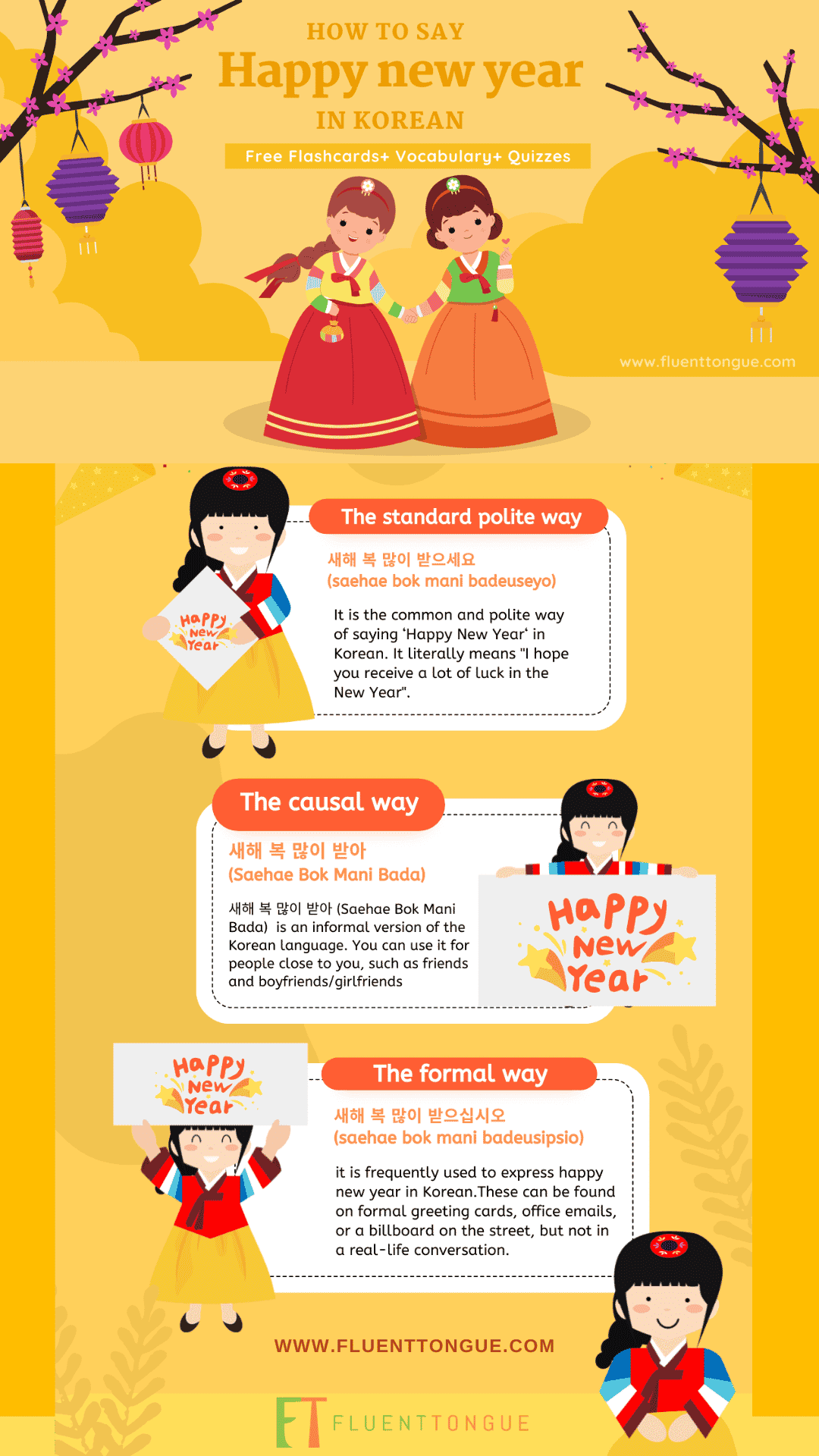
To say Happy New Year in Korean language is 새해 복 많이 받으세요 (saehae bok mani badeuseyo) means “I wish you good luck in the New Year.” To say causally in hangul, you can say 새해 복 많이 받아(Saehae Bok Mani Bada) and 새해 복 많이 받으십시오 (saehae bok mani badeusipsio) is a formal way of wishing someone a happy new year in Korea.
새해 (saehae) translates to ‘new year,’ 복(bok) to ‘luck,’ and 많이 (mani) to a lot of.’ 받으세요 (badeuseyo) comes from the verb 받다 (batda), meaning ‘to receive.
Here’s how to say Happy New Year in Korean in casual, polite, formal situations.
- The standard polite way- 새해 복 많이 받으세요 (saehae bok mani badeuseyo)
- The causal way -새해 복 많이 받아 (Saehae Bok Mani Bada)
- The formal way – 새해 복 많이 받으십시오 (saehae bok mani badeusipsio)
So if you aren’t certain of someone‘s age or how to greet them it’s best to stick with the polite version of 새해 복 많이 받으세요 (saehae bok mani badeuseyo).
Let’s see them in detail
Happy New Year In Korean Informal|How to Say Casual Speech for Friends or Kids?

Another Happy New Year in Korean translation is 새해 복 많이 받아 (Saehae Bok Mani Bada). It is an informal version to say a happy new year in the Korean language.
Since this Korean New Year greeting is quite casual, you can use it for people close to you, such as friends and boyfriends/girlfriends. The polite ending ‘받으세요)’ has been replaced with ‘받아’.
You shouldn’t be used in formal situations, especially when you’re talking to older people and wishing them a happy New Year in Korea.
Here’s how to say it
Happy New Year in Korean standard way| polite speech for common adults

If you want to say Happy New Year in Korean language in just one word without offending someone, this is all you need to know.
새해 복 많이 받으세요 (saehae bok mani badeuseyo) is the polite way of saying ‘Happy New Year‘ in Korean . It means “I hope you receive a lot of luck in the New Year”.
새해 (saehae) means ‘new year’, 복 (bok) means ‘luck’, and 많이 (mani) means ‘many’ or ‘lots of’.
받으세요 (badeuseyo) is the honorific way of saying 받다 (batda), meaning ‘to receive.
You would say this kind of Korean New Year greeting only when you are talking to your teacher, boss, family, grandparents, older friends, or coworkers, or whenever you need to be polite.
It sounds a bit awkward in English of course, but that’s how Koreans celebrate this colorful holiday and will wish you a happy new year in Korea.
Happy New Year in Korean formal

If you are stuck in formal situations, how do you say a happy new year in Korean with respect?
Here’s how
The phrase 새해 복 많이 받으십시오(saehae bok mani badeusipsio) is frequently used to express happy New Year in Korean language in formal settings.
The 십시오(sipsio) ending is an extra-formal way of stating 세요 (seyo).
You’ll hardly find this kind of Korean Happy New Year greetings in real-life conversations. but being able to identify it whenever you see it would still be beneficial.
Koreans use it on formal Korean greeting cards, office emails, or billboards on the street to wish a happy new year in Korea.
how to write Happy New Year in Korean
Happy New Year in Korean translation is “새해 복 많이 받으세요” and pronounced as “saehae bok mani badeuseyo”.
To write “새해 복 많이 받으세요” in Korean, you can use the following characters:
새 (sae) + 해 (hae) = 새해 (saehae)
복 (bok) 많 (man) + 이 (i) = 많이 (mani)
받 (bat) + 으 (eu) + 세 (se) + 요 (yo) = 받으세요 (badeuseyo)
This phrase means “happy new year,” and is used to wish someone a happy and prosperous new year.
Note that in Korean, the verb usually comes before the subject, so the structure of this phrase is “receive a lot of good fortune new year.”
Must-Know Korean Words & Phrases for the New Year!
Great job. You finally know how do you say Happy New Year in Korean and other Korean New Year greetings.
but if you want to spend a Happy New Year in Korea with your loved ones, you’re gonna much more than that.
So, it’s time to learn some words related to Korean Happy New Year.
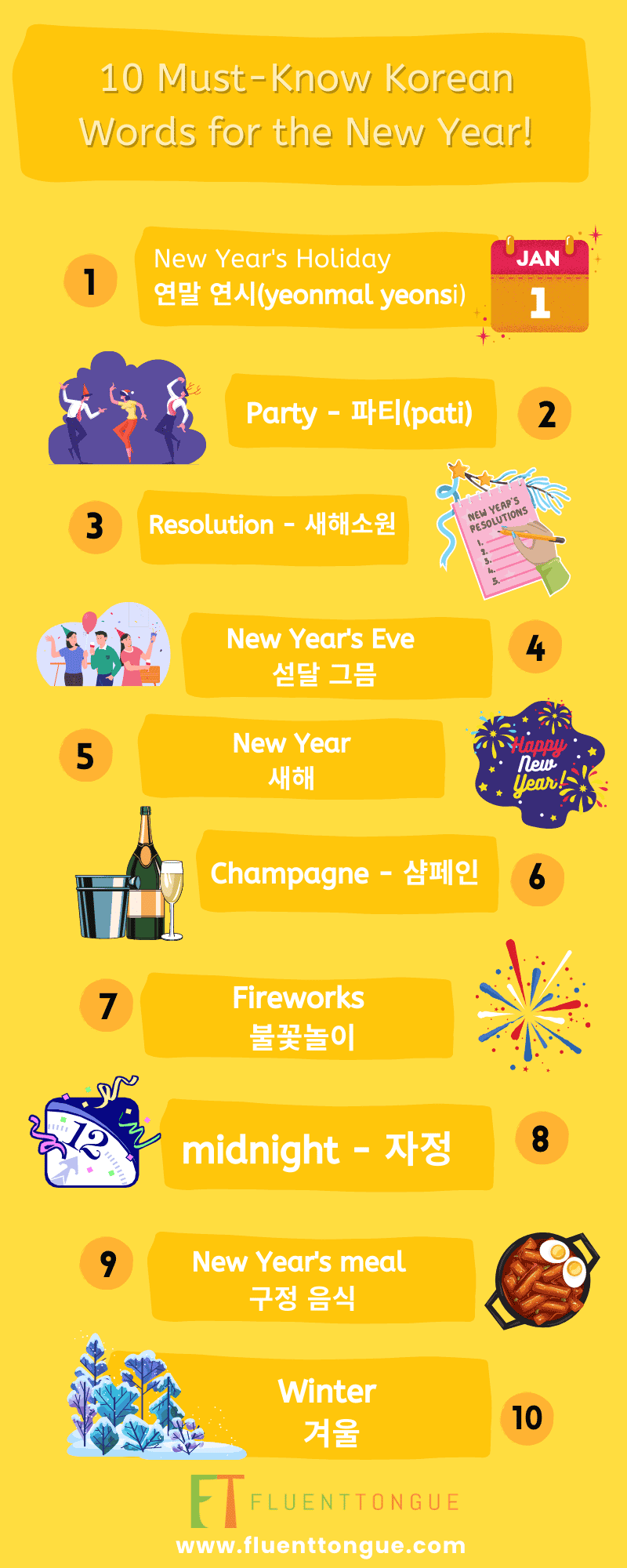
Here’s a list of common Korean words you’ll hear during the New Year’s celebrations in Korea.
- midnight – 자정(jajeong)
- New Year’s Day – 새해 첫날(saehae cheonnal)
- Year – 년(nyeon)
- Party – 파티(pati)
- Fireworks – 불꽃놀이(bulkkotnori)
- Fortune- bok
- New Year’s Holiday – 연말 연시(yeonmal yeonsi)
- Countdown – 카운트 다운(kaunteu daun)
- toast – 건배(geonbae)
- Champagne – 샴페인(syampein)
- New Year’s meal – 구정 음식(gujeong eumsik)
- Resolution – 새해소원(saehaesowon)
- New Year – 새해
- Parade – 퍼레이드(peoreideu)
- New Years Eve – 섣달 그믐(seotdal geumeum)
- Winter – 겨울(kyul)
TOP 9 COMMON Korean NEW YEAR GREETINGS
Just saying “Happy New Year in Korean language” on its own might sound a bit dull.
So if you want to impress your friends with your language skills, mix and match all the Korean greetings you’ll learn now and add them after Korean New Year greetings to make them a little fancier.
So, here are other Korean New Year greetings that you can consider.
- I wish you all the best in the new year
- 새해에는 좋은 일만 가득하길 바래.- saehaeeneun joeun ilman gadeukagil barae
- Everyone, be rich.
- 모두 부자가 되세요- modu bujaga dweseyo
- I hope everything you do will go well
- 당신이 하는 모든 일이 잘 되길 바랍니다.
- Have a great winter vacation!
- 겨울 방학 잘 보내세요! – gyoul banghak jal bonaeseyo
- Happy new year and always be happy.
- 새해 복 많이 받으시고 항상 행복하세요
- How old are you this year?
- 올해 몇 살이에요?olhae myot sarieyo
- What’s your plan this year?
- 올해 계획이 뭐예요?olhae gyehwegi mwoeyo
- Please stay healthy in coming year too
- 내년에도 건강하세요- naenyonedo gonganghaseyo
- Happy holidays!
- 행복한 휴일 보내세요!haengbokan hyuil bonaeseyo
If you feel confident in your Korean abilities and vocabulary, you can try to mix these Korean must-know words while talking about Happy New Year in Korea.
how to say Happy Holidays in Korean
Now that you know all about Korean New Year greetings, it’s time to learn how to say happy holidays in Korean
“행복한 휴일 보내세요!” (haengbokan hyuil bonaeseyo) means “have a happy holiday!” or spend happy holidays in Korean.
Here’s how to break down the phrase:
- 행복한 (haengbokan) means “happy” or “joyful.”
- 휴일 (hyuil) means “holiday.”
- 보내세요 (bonaeseyo) is a polite way to say “spend” or “have.”
So, putting it all together, “행복한 휴일 보내세요” literally means “spend happy holidays in Korean”.
Seotdal geumeum| How to say New Year’s Eve in Korean
Seotdal Geumeum (섣달그믐) refers to the Lunar New Year’s Eve. How to say New Year’s Eve in Korean
What wishes are said during the Korean New Year holiday or 설날?
During the Korean New Year (Seollal) holiday, it is traditional to exchange well wishes and greetings in Korean with family and friends.
Here are some common Korean must-know words and phrases that are used to express these wishes while talking about the happy new year in Korea.
- 새해 복 많이 받으십시오 (saehae bok mani badeusipsio): May you receive many blessings for the new year.
- 새해 복을 빕니다 (saehae bok-eul bimnida): I wish you a blessed new year.
- 새해 복권을 잡고 있으시길 바랍니다 (saehae bokgwon-eul jabgo isseusigil baramni da): I hope you catch the new year’s luck.
- 새해부터 건강하고 행복한 한해 되세요 (saehae buteo geonganghago haengbokhan hanhae doeseyo): May you be healthy and happy for the whole new year.
How to say New Year’s resolutions in Korean?
Great job. now that we know how to say Happy New Year in Korean language in different ways. it’s time to move on to new year resolutions in Korean
After all, how can Korean New Year’s Day be completed without resolutions?
And here’s how to say it
새해 결심 (Saehae Gyeolshim) is the common way to say New Year’s resolution. It came from the word new y새해[saehae] means new year and 결심(gyolsim) means resolution.
however, there are 3 different words for the new year like 새해[saehae],신년[sinnyeon] or 올해 [olhae]).
Also, you can say resolutions in Korean with 3 different words i.e. 계획(gyehwek) means a plan, 결심(gyolsim) means resolution and 목표(mokpyo)means goal.
So, Here are the 9 ways you can translate the New Year’s resolution in the Korean language and have a happy Korean New Year.
- 새해 계획(saehae gyehwek),
- 새해 결심(saehae gyolsim),
- 신년 결심(sinnyon gyolsim),
- 새해목표(saehaemokpyo),
- 신년계획(sinnyongyehwek),
- 신년목표(sinnyonmokpyo),
- 올해계획(olhaegyehwek),
- 올해결심(olhaegyolsim),
- 올해목표(olhaemokpyo).
But you don’t have to remember all of them
Because Korean commonly used 새해 계획(saehae gyehwek), 새해목표(saehaemokpyo), 신년목표(sinnyonmokpyo) in real-life conversation.
So how to talk about your resolution in Korean
Top 20 common phrases to talk about your New Year’s resolution in Korean.
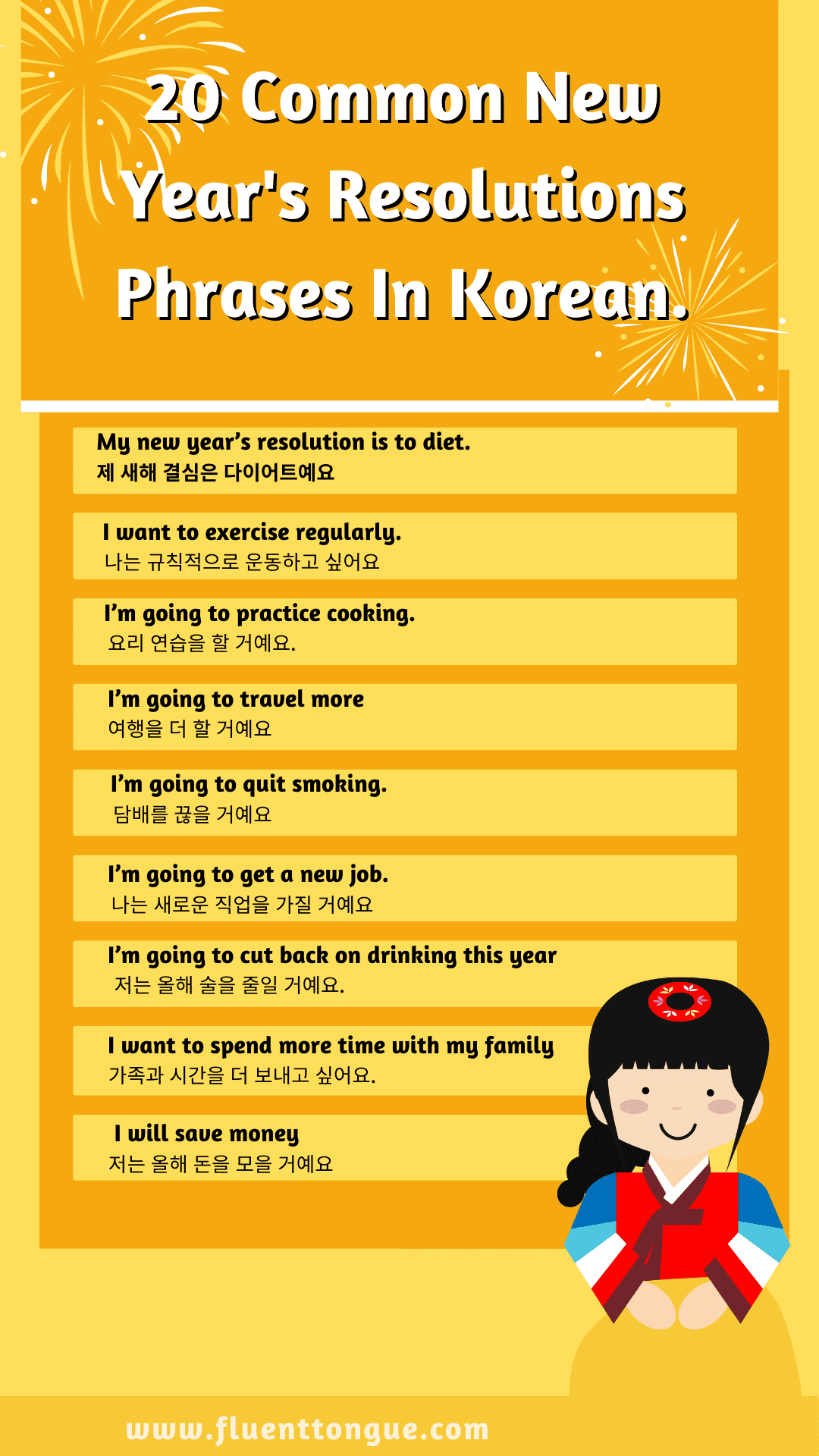
you may have spent a happy Korean New Year with friends and family. but without a strong resolution, your happiness cannot last longer in the next year.
So, many common things that people usually make up their minds about during on Korean Happy New Year date and have a new year resolution.
Here are the common Korean must-know words and phrases that you can use to talk about your New Year’s resolution and spend a happy Korean New Year with natives.
My New Year’s resolution is to diet.
제 새해 결심은 다이어트예요- je saehae gyolsimeun daioteueyo
I’m going to learn Korean this year.
저는 올해 한국어를 배울 거예요.-joneun olhae hangugoreul baeul goeyo
I want to exercise regularly.
나는 규칙적으로 운동하고 싶어요.naneun gyuchikjjogeuro undonghago sipoyo
I’m going to wake up early every day this year.
저는 올해 매일 일찍 일어날 거예요- joneun olhae maeil iljjik ironal goeyo
I’m going to cut back on junk food this year.
저는 올해 정크 푸드를 줄일 거예요.-joneun olhae jongkeu pudeureul juril goeyo
I will save money
저는 올해 돈을 모을 거예요.-joneun olhae doneul moeul goeyo
I’m going to make more money this year.
저는 올해 돈을 더 벌 거예요-joneun olhae doneul do bol goeyo
My new year’s goal is to lose weight
제 새해목표는 살 빼기예요-.-je saehaemokpyoneun sal ppaegieyo
I’m going to cut back on drinking this year
저는 올해 술을 줄일 거예요.joneun olhae sureul juril goeyo
I’m going to get a new job.
나는 새로운 직업을 가질 거예요- naneun saeroun jigobeul gajil goeyo
I want to spend more time with my family
가족과 시간을 더 보내고 싶어요.- gajokkkwa siganeul do bonaego sipoyo
I’m going to travel more
여행을 더 할 거예요- yohaengeul do hal goeyo
I’m going to practice cooking.
요리 연습을 할 거예요.- yori yonseubeul hal goeyo
I’m going to quit smoking.
담배를 끊을 거예요- dambaereul kkeuneul goeyo
Done with this. great
but how to ask someone “What’s your New Year’s resolution” in Korean?
In Korean, “What’s your New Year resolution” can be translated as “새해 의지가 뭐에요?” or “새해 의지가 무엇입니까?”
How is the Korean New Year celebrated?
Korea celebrates two new years. One is based on the solar calendar(the Western New Year) called sin-jeong’ (신정) and the other is based on the lunar (Chinese) calendar, known as gu-jeong(구정)
The date of the Korean New Year changes every year, so to answer “When is the Korean New Year celebrated?” is a bit tricky.
But Every year, it falls between late January and early February. The New Year holidays are 3 days long.
The largest holiday in Korea is ‘gu-jeong’ (구정). Koreans do not celebrate 신정 (Sinjeong) as grandly as they do 설날 (Seollal) or the Lunar New Year’s Day, even though they utilize the solar calendar.
신정 (Sinjeong) – Korean Solar New Year| What is Korean New Year called?
On January 1st, Korea observes its Solar New Year. (Sinjeong) isn’t as big a deal in Korea as (Seollal) or Lunar New Year’s Day.
On New Year’s Eve of (Sinjeong), however, relatives and close friends continue to meet to greet the new year.
Koreans typically attend the traditional Bell Ceremony (보신각타종행사) in Bosingak (보신각), which is located in Seoul, during 신정 (Sinjeong).
Because it was in the middle of the castle during the Joseon period (조선시대), this bell has a long and interesting history.
However, in today’s world, they no longer use the original, instead opting for a replica to conserve the original.
설날 (Seollal)- Korean Lunar New Year|When is the Korean New Year?
설날(Seollal) is a South and North Korean national holiday observed in late January (or early February) and based on the moon’s monthly cycles.
The festivities normally span three days: the day before New Year’s Day, New Year’s Day, and New Year’s Day itself.
Koreans visit their parents and other relatives during 설날(Seollal) and execute an ancestral ceremony known as charye.
Koreans dress up in beautiful traditional Korean clothing called hanbok and pay respect to their ancestors on the first day of the event.
As a tribute to the ancestors, traditional foods are laid on a table, and the rite begins with deep bows from all members of the family.
On the first day of the Korean New Year, this is a gesture of respect and a very traditional practice.
What is Sebaet Don and the Korean bow?
https://www.youtube.com/shorts/1QTVU9QqmnI
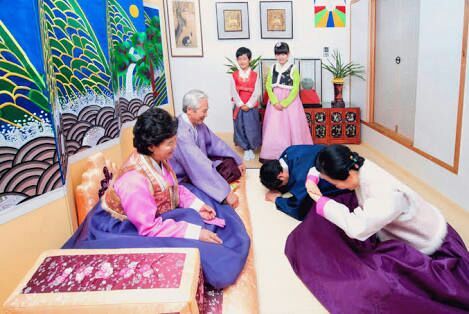
People wearing traditional dress greet their elders (grandparents, parents, aunts, and uncles) with a deep traditional bow and the words ‘saehae bok mani badeuseyo'(새해 복 많이 받으세요) means ‘Please receive a lot of good fortune for the New Year’.
Elders typically reward this behavior by giving kids Sebaet Don, or “free cash,” in silk bags with lovely classic designs, as well as giving words of wisdom (dkdam).
The entire family gathers to celebrate the new year (Seollal).
Due to the high number of folks heading home to their relatives, you can expect major traffic during this time. Fruits are particularly pricy.
Food expenses are inflated in the period of Seollal due to huge demand.
Korean New Year food|What do South Koreans eat on the Lunar New Year?
During (Seollal), the entire family gathers to celebrate the new year. As a result, they cook a variety of dishes for the family.
In Korea, it is traditional to eat a variety of foods during the New Year’s holiday, which is known as Seollal.
Some of the common foods that are enjoyed during this time include rice cake soup (tteokguk), which is believed to bring good luck and is often eaten on the first day of the lunar New Year, and
dumplings (mandu), which are also considered to be a symbol of good fortune.
Other popular dishes that may be served during Seollal include various types of grilled meat, such as bulgogi (marinated beef), galbi (marinated short ribs), and samgyeopsal (grilled pork belly), as well as a variety of side dishes called banchan.
Here are the most common foods you’ll see during (Seollal) in Korea.
Tteokguk|Why do natives eat rice cake soup on Korean New Year’s Day?
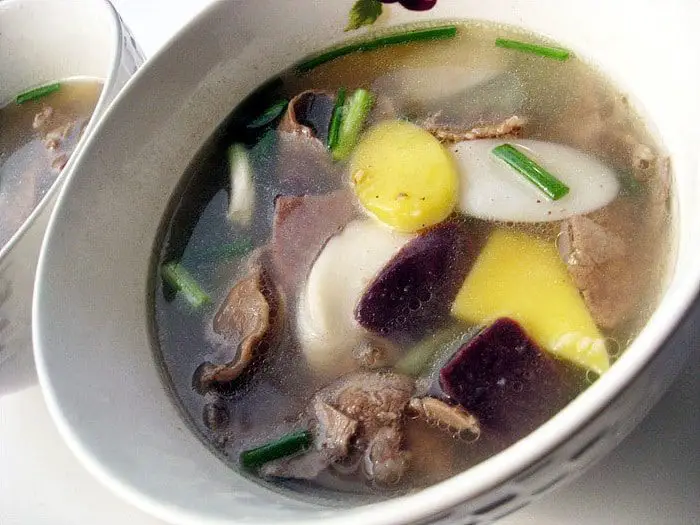
떡국 (Tteokguk) (soup with sliced rice cakes) is a traditional Korean New Year’s dish.
As per the Korean age system, everybody grew a year older on New Year’s Day. When a person has finished his\her tteokguk, they are one year older.
Did you know?
If you want to more about what’s your age in Korean and the Korean age system, here’s a complete guide on how to calculate your age in Korean in 5 minutes
Eating rice cake soup, or tteokguk, on New Year’s Day is a traditional Korean custom that is believed to bring good luck and long life.
Tteokguk is a soup made with thin slices of rice cake, beef broth, and vegetables, and is typically served with diced boiled egg and green onions.
It is believed that eating a bowl of tteokguk on New Year’s Day will bring good fortune and prosperity in the coming year.
The rice cake is also thought to symbolize the passing of another year and the start of a new one, and the broth is believed to have a cleansing effect on the body, symbolizing the start of a new year with a clean slate.
In addition to its symbolic significance, tteokguk is also a hearty and flavorful dish that is enjoyed by many people in Korea during the cold winter months.
It is often served at celebrations and family gatherings and is an important part of the traditional Korean New Year’s Day feast.
The rice cake in the 떡국 (Tteokguk) looks like a coin, and many folks ate lots of rice cakes in the hope of becoming rich and successful in the new year.
전( Jeon)
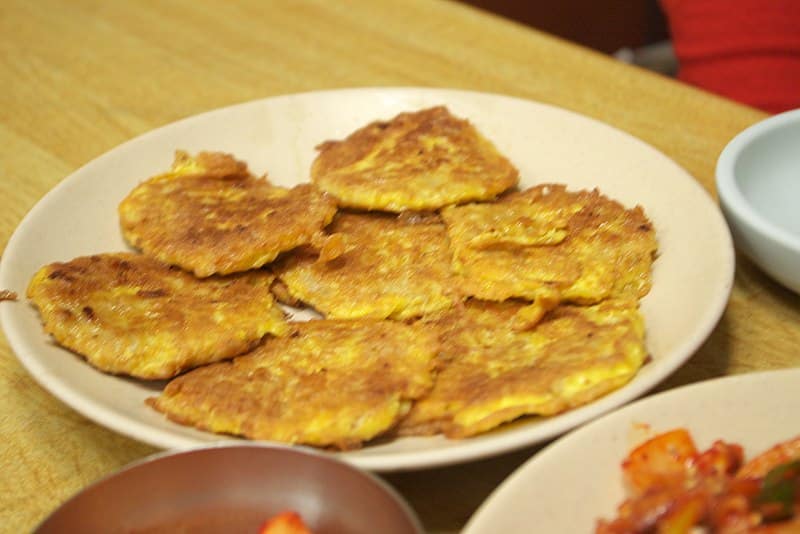
전( Jeon), also known as buchimgae, is a traditional Korean dish that is usually served on Korean New Year’s Day. It is just a flavorful pancake that is torn apart with chopsticks instead of sliced with a knife in the belief that all of this improves the taste.
Other food
만두국 (Manduguk), 잡채 (Japchae), 갈비찜 (Galbi-jjim),수정과 (SuJeongGwa) and 식혜 (Sikhye), are other popular choices.
Korean New Year games
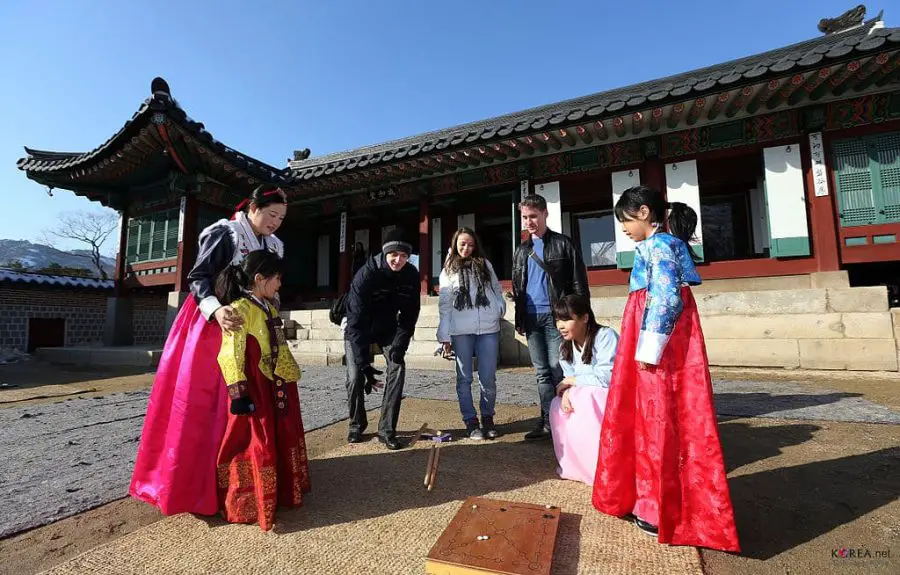
The Korean New Year is celebrated with a lot of exciting traditional games. Yutnori is a popular family board game played with a set of specially designed sticks during the Korean New Year.
Men and boys also fly square kites known as Yeon (see yeonnalligi) and play jegichagi, a game in which a tiny object is wrapped in cloth and kicked in a footbag-like manner.
Neolttwigi (jumping on a seesaw) is a traditional Korean game played by women and girls. gongginori is a game in which the five little ( little stones, but gongi toys ) fight against one another.
how to say happy in Korean
In Korean, “happy” can be translated as 행복한 (haengbokhan).
You can use this word to express happiness or to wish someone happiness.
For example, you can say “새해 복 많이 받으십시오” (saehae bok mani badeusipsio), which means “may you receive many blessings for the new year,” or “새해부터 건강하고 행복한 한해 되세요” (saehae buteo geonganghago haengbokhan hanhae doeseyo), which means “may you be healthy and happy for the whole new year.”
Other ways to express happiness or to wish someone happiness in Korea include:
- 축하해요 (chukhae-yo): Congratulations!
- 축하합니다 (chukhae-hamnida): Congratulations! (formal)
- 축하해요 (chukhae-yo): Happy birthday!
- 축하합니다 (chukhae-hamnida): Happy birthday! (formal)
- 축하해요 (chukhae-yo): Happy anniversary!
- 축하합니다 (chukhae-hamnida): Happy anniversary! (formal)
Conclusion
Voila!! You now know how to say Happy New Year in Korean, and also a few other helpful phrases!
You’re now able to respond to everyone’s holiday wishes and greet your dear ones with a Happy And prosperous New Year in Korean.
So, let’s not be shy to apply your vocabulary words to show your care for your family and friends during the holidays and let them know that you wish them a happy and healthy new year.
Still in the holiday spirit? Check out our articles on Korean Christmas vocabulary and traditions.
Have you ever been to a New Year party in Korea? Or how do you celebrate it with your family? What was your experience like? Let us know in the comments below (we love to hear your thoughts)
